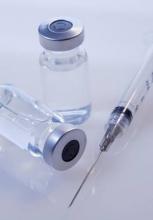A study that tracked the incidence of Guillain-Barré syndrome in Californians over the course of more than 30 million person-years found no evidence that risk that immunization increased the risk for the disorder, according to a report published online in Clinical Infectious Diseases.
This retrospective study could not definitively exclude a possible weak association between vaccines and GBS, partly because the rarity of the disorder limited the study’s power to fully assess this risk. But the findings "provide reassurance that the risk of GBS following any vaccine ... is extremely low," said Dr. Roger Baxter of the Kaiser Permanente Vaccine Study Center, Oakland, Calif., and his associates.
Concern about a link between vaccinations and GBS have "flourished" since a study found a small but significant increase in cases during the 6 weeks following immunization against the 1976 Swine flu. Since that time, studies assessing GBS risk after seasonal flu vaccinations "have shown either no risk or a very small attributable risk of approximately one case per million doses," the investigators wrote (Clin. Infect. Dis. 2013;57:197-204 [doi:10.1093/cid/cit222]).
Similarly, no conclusive evidence has been found linking GBS with other vaccines, but there have been a small number of case reports in which the disorder developed following tetanus, rabies, polio, or hepatitis B vaccination.
In contrast, the evidence is clear that GBS is temporally associated with infectious diseases. "Most published case series report that approximately two-thirds of all cases are preceded by a gastrointestinal or respiratory infection within the prior 3 months. Campylobacter enteritis is the most common trigger, but influenza, cytomegalovirus, Epstein Barr virus, HIV, and Mycoplasma pneumoniae, among others, have been implicated as well," Dr. Baxter and his colleagues said.
They used information from Kaiser’s database of electronic medical records and its immunization tracking system to examine a possible association between GBS and immunizations. The researchers identified 415 patients who were hospitalized with GBS between 1994 and 2006 and had received any vaccination during the year preceding symptom onset.
During 32,734,642 person-years of observation, the overall incidence was 1.27 cases of GBS/100,000 person-years. This rate is comparable with that reported in previous studies of GBS incidence.
As has been reported in previous studies, the majority (59%) of cases in this study occurred in males.
The mean age of GBS patients was 49 years (range, 5-87 years). Two-thirds of cases (67%) had a documented respiratory or gastrointestinal illness during the 90 days preceding onset of GBS.
Only 25 of these 415 patients had received any vaccine during the 6 weeks before symptom onset. This included 18 patients who had received influenza vaccines, and one to three patients each of whom had received vaccines against pneumococcus, tetanus-diphtheria, hepatitis A, or hepatitis B, Dr. Baxter and his associates said.
Of the 18 patients who developed GBS within 6 weeks of receiving an influenza vaccine, 13 had known respiratory or gastrointestinal illness during that period, which also may have predisposed them to GBS. These 18 cases also occurred against a backdrop of 6,841,901 flu immunizations given during that interval.
Six of the remaining seven patients who developed GBS within 6 weeks of a noninfluenza vaccination also had respiratory or gastrointestinal illness during that interval.
There was no association between GBS and any of the vaccines typically administered during childhood, despite the extremely large number of doses given: For example, 1.2 million doses of oral polio vaccine, 1.6 million of MMR, and 764,000 varicella vaccine were dispensed.
There was no significant difference in the rate of GBS among people vaccinated up to 6 weeks prior to symptom onset and those vaccinated from 6 weeks to 12 months prior to symptom onset, judging from the findings of a secondary cohort analysis.
GBS was significantly more likely to occur during the winter months than during any other season.
This study was supported by America\'s Health Insurance Plans and the Centers for Disease Control and Prevention. Dr. Baxter and one of his associates reported ties to GlaxoSmithKline, MedImmune, Merck, Novartis Vaccines, Pfizer, and Sanofi-Pasteur.


